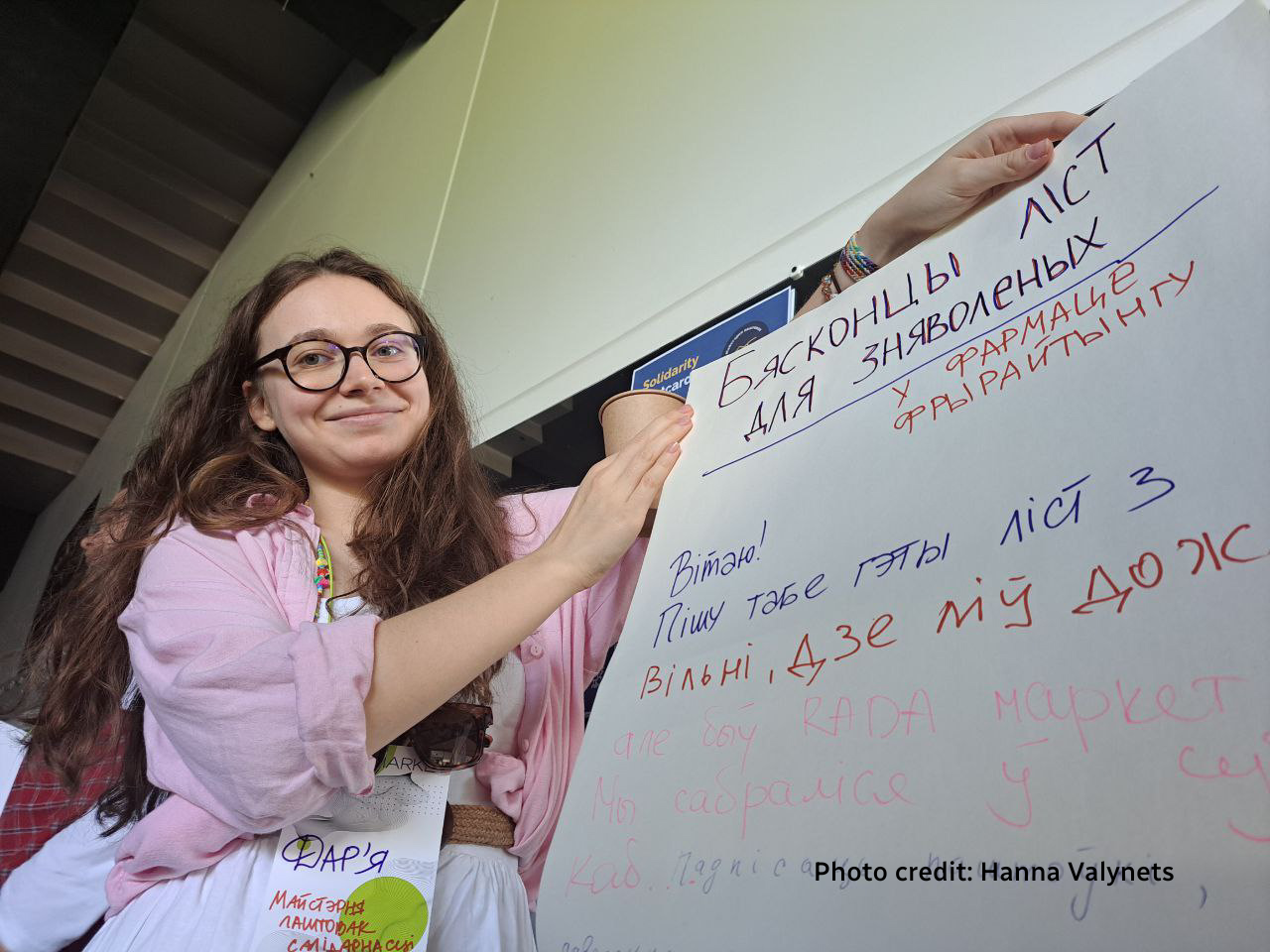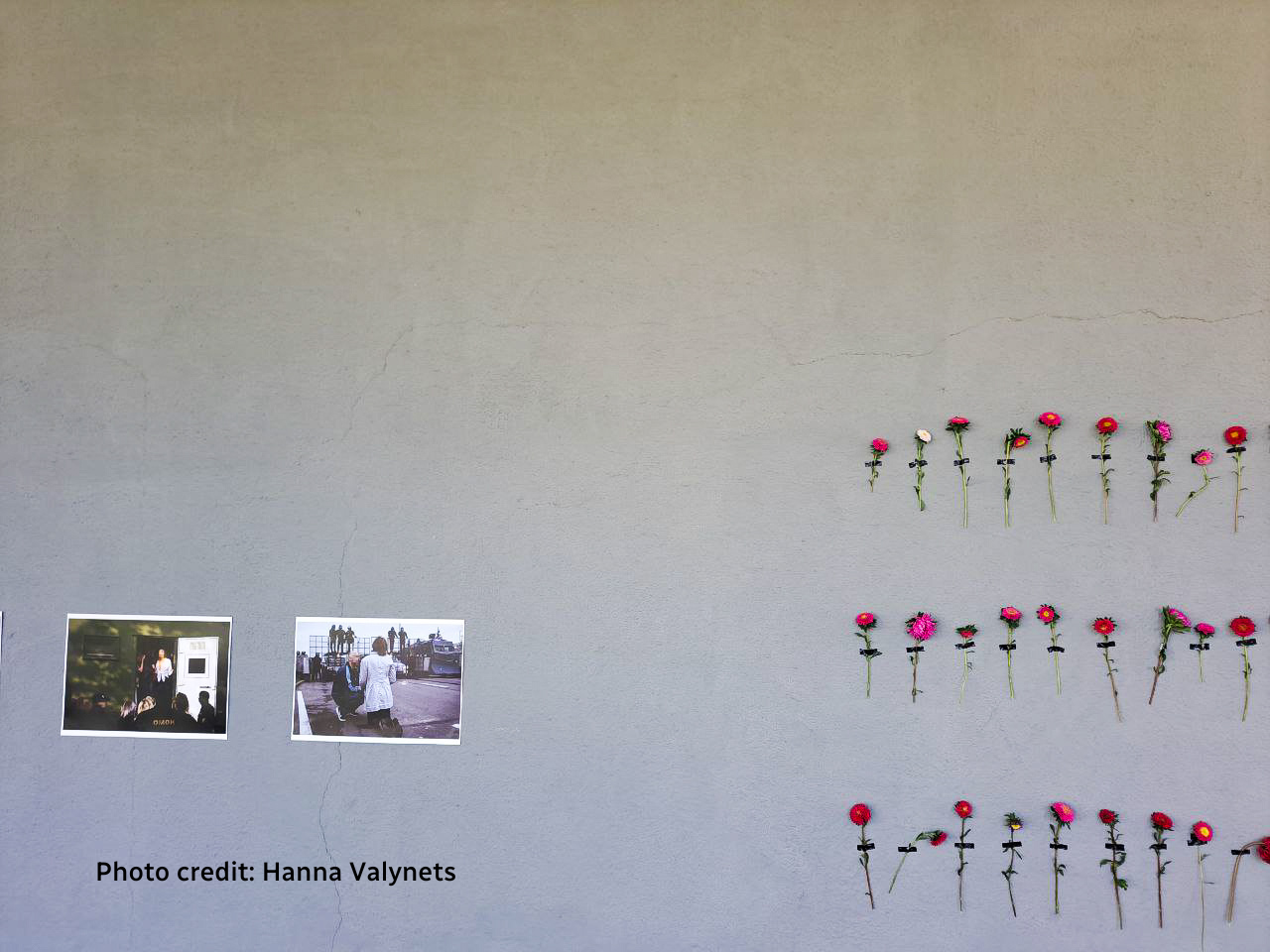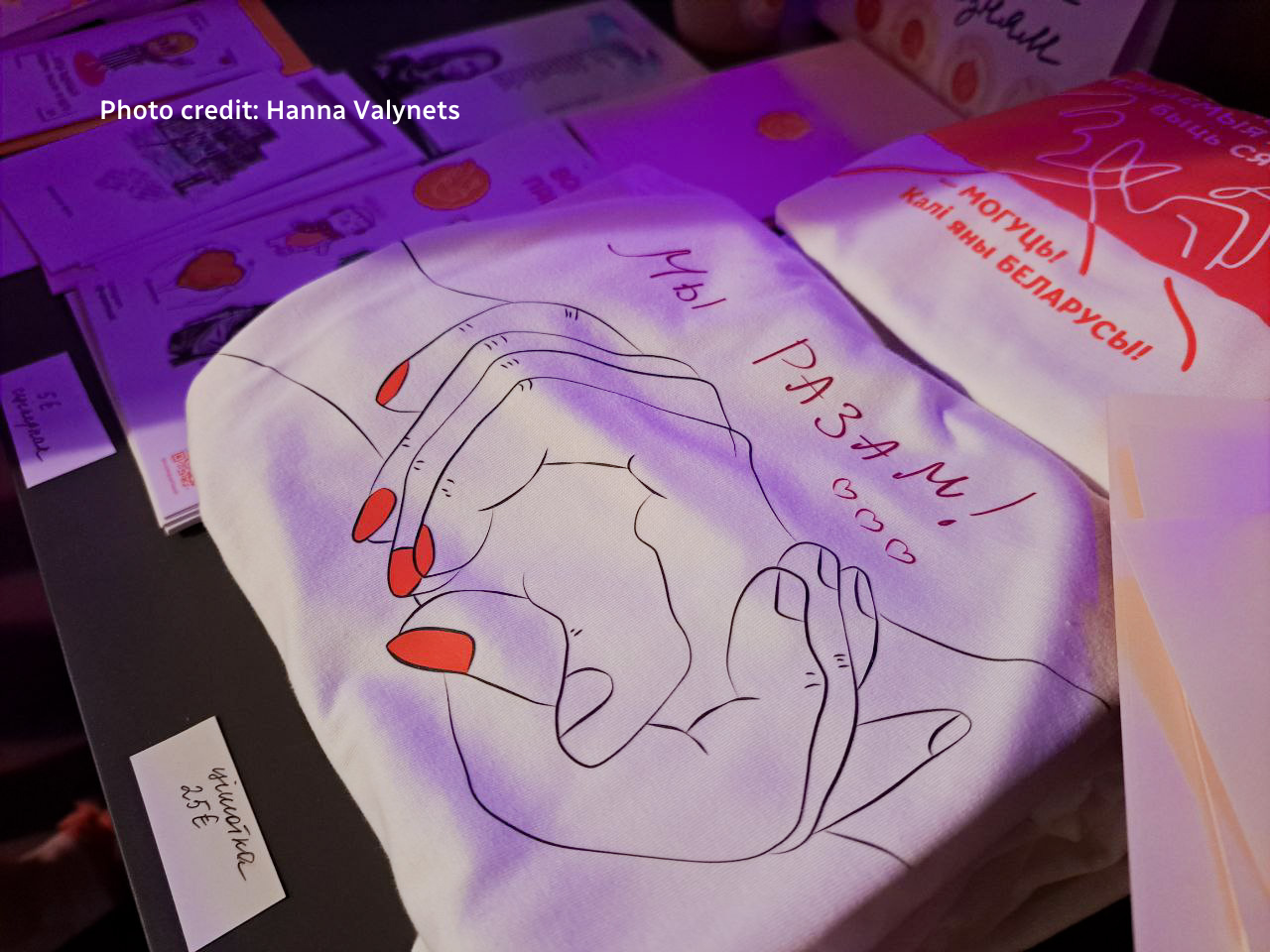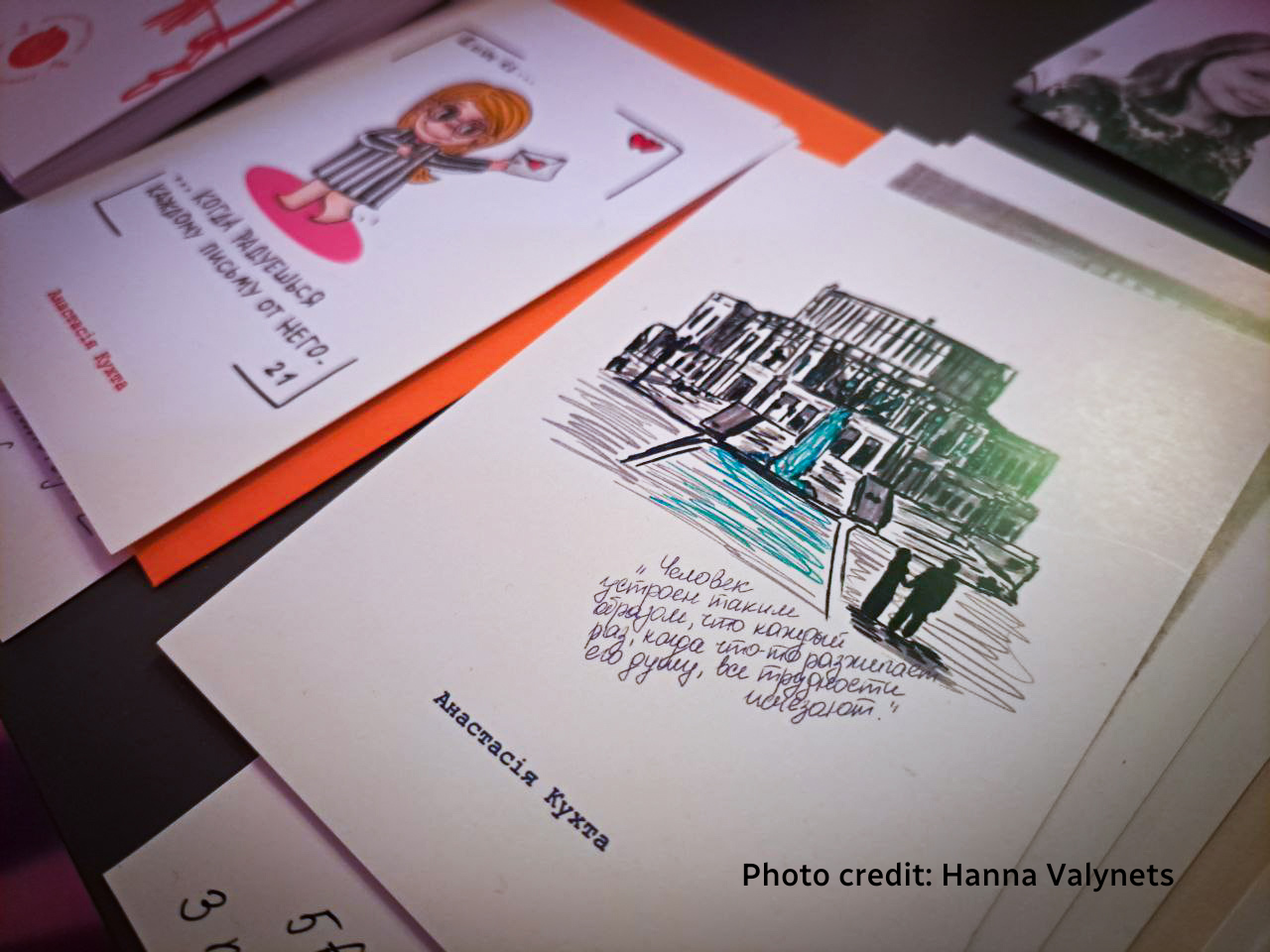Youth in a Challenging Situation: How the Belarusian National Youth Council RADA Works in Exile
The youth of Belarus is divided now between those in the country and those abroad. But this does not mean a split.
Solidarity With Political Prisoners Through Letters
“Hello! I am writing this letter to you from Vilnius, where it has been raining.” These are lines from the “endless” letter to political prisoners. Belarusians wrote it collectively in August 2023 during the RADA Market in Vilnius, Lithuania. The letter was composed through freewriting, with a large number of people each adding a bit.
The idea came from the Solidarity Postcards Atelier, which helps political prisoners. This volunteering initiative emerged in 2020 in Belarus as a response to the mass detentions and criminal prosecutions during and after the fraudulent presidential election campaign.
“Back then, we hand-drew all postcards, collected postage stamps from people we knew, and wrote to everyone on the list of detainees”, says Darya Rubleuskaya, coordinator of the Solidarity Postcards Atelier.

Every month, at least 500 messages are sent to political prisoners through the initiative. Volunteers help deliver these messages to people who have been imprisoned because of their views.
“We show by our own example that solidarity can manifest itself in such small and simple, but meaningful, actions”, says Rubleuskaya. “Former political prisoners and their families have a special warmth for us”.
In addition to the “endless” letter, she and other participants of the initiative invited the attendees of the RADA Market on August 12 to sign or draw postcards intended for political prisoners. The event was organized by the Belarusian National Youth Council RADA. In 2023, the RADA Market was held again after a long break, relocating from Belarus to Vilnius.
Pandemic, Revolution, Repression—and Survival
No less than 250 guests and 57 initiatives and organizations participated in the RADA Market. Besides the initiatives to support political prisoners, the event featured human rights defenders and cultural and educational organizations such as the International Committee for Investigation of Torture and the Center for New Ideas. Artisans were present as well, and guests enjoyed stand-up comedy performances and music in the evening.
“It’s a day for a retreat, where you can simply spend time with interesting and energetic people instead of dwelling on problems. You get to explore your interests and find out what you’d like to be a part of”, explains Katerina Bunina, RADA’s communications manager.
Initially launched in 2016 in Minsk, the event was also held in other large cities of Belarus: Viciebsk, Brest, and Hrodna. But 2020 saw the start of the Covid-19 pandemic and the shift to remote working, and then the postelection uprising, repression, and emigration of hundreds of thousands of people.

“In 2020, it seemed that the last months of RADA’s existence were coming. It seemed that everyone around had lost motivation and that the main goal was just to survive”, says Anna Dapshevichute, the organization’s secretary-general.
In the following months, RADA faced the emigration of all its employees and forced liquidation as well as persecution and arrests among the country’s youth. Today, though, the organization has not only survived; it is working more actively than before the 2020 crisis. Dapshevichute explains that, until 2020, there was no large dialogue about the necessary changes in Belarus between civil society organizations and the democratic political forces. In addition, there was no advocacy work such as what is being done today.
“RADA has always had strong connections with European organizations and foundations, and national councils, the Council of Europe. At the same time, the opportunities now have significantly expanded and strengthened. Everyone wants to hear about Belarus”, says its secretary-general.
Diverse Needs Inside and Outside Belarus
RADA currently includes 38 member organizations, with 13 joining in the last three years, while only one left. Half of the members work from Belarus, the rest from abroad.
“People inside and outside Belarus have diverse needs and requests, different levels of energy and range of opportunities”, says Dapshevichute. “These groups require distinct methods of work, and I even began to feel that we needed to agree that we are now two subjects—Belarusians inside and outside—and close this question. However, we find out that no one wants this. No one perceives others as being different”.
The work of RADA in Belarus involves high secrecy: for instance, two initiatives can work in the same city on the same topic and not know each other.
“From time to time, we arrange phone calls with RADA’s member organizations, and within a week or two we talk with everyone. During this time, you can meet two people from the same city who are dealing with ecological issues, but do not know each other”, explains the secretary-general.
Organizations inside the country no longer make public announcements or use mailing lists. They work with their communities, and new members are accepted only upon recommendation. Meanwhile, organizations abroad operate more openly.
Young people have become more active and require a greater amount of alternative information than before. At the same time, young people outside and inside the country have a different range of opportunities.
“In Belarus, any adequate development is not accessible to you, while there are problems everywhere for the average youth. On the other hand, numerous organizations outside Belarus are ready to offer support”, explains Dapshevichute.
"Don’t Stop Shine!"
Since the 2020 uprising, support programs have become one important part of RADA’s work. They include different forms of aid, ranging from psychological support to education and even facilitating evacuation from the country in cases of persecution or other politically related issues.
“A large number of young people have found themselves in challenging situations. We try to help in avoiding losing their mind, living without food or lacking even a short-term plan for life”, says Dapshevichute.
RADA puts together reports documenting the current state of affairs in the country and violations of youth rights. These reports offer alternative perspectives to those issued by the government.
Meanwhile, there are about 1,500 political prisoners in Belarus, of which 639 are youths. One parcel with necessary items sent to a political prisoner in detention can cost €250, notes the team of Freedom Postcards, which supports political prisoners. The initiative creates postcards and merchandise, sells them, and transfers the funds to the Dissident.by initiative, which collects the names of political prisoners, helps them, and supports their families. Dissident.by spends the money on sending the parcels to the prisons.

The postcards are printed using images drawn by political prisoners. “Don’t stop shine!” is written on one postcard. Another one says: “A person is designed in such a way that, whenever something ignites the soul, difficulties vanish.”

The Freedom Postcards team says: “It all began with 10 drawings. A girl who wrote actively to political prisoners sent us the images. We decided to share them with the world and made our first set of postcards”. Sviatlana Tsikhanouskaya, the leader of the Belarusian democratic movement, once showed the postcards in the European Parliament, they say.
Education and Advocacy
RADA works in different fields and with diverse audiences: youth, the democratic forces, and European stakeholders. It also represents the interests of Belarusian youth at international events.
The organization conducts educational programs at three levels: basic nonformal education, training for employees of civil society organizations, and programs designed for future educators. The latter are especially important as the demand for nonformal education has increased in the last few years. RADA also advocates the rights of youth and for non-discrimination of Belarusians. “Now Belarusians have been banned at many levels due to the war. For example, they can’t participate in any exchange programs”, says the RADA secretary-general. “Not everyone realizes the distinction between official Belarus and the independent sector”.
As one of the Belarusian civil society organizations in exile, RADA is undergoing the process of liquidation in the country. “We registered as an institution in 2019 to be able to officially speak with state organizations. They initiated our liquidation in 2021”, explains Dapshevichute. “However, we considered it to be an action without legal force and I decided not to assist in it: I refused to give the papers to the archive and so on. In my view, RADA can continue its work. And thus, here we are. The organization has been in the process of liquidation for two years already”.
Despite this, RADA’s plans to return from online to offline activities. “We have already started planning a big RADA FORUM conference and our favorite event, RADA AWARDS. We hope to have both this year,” she says.